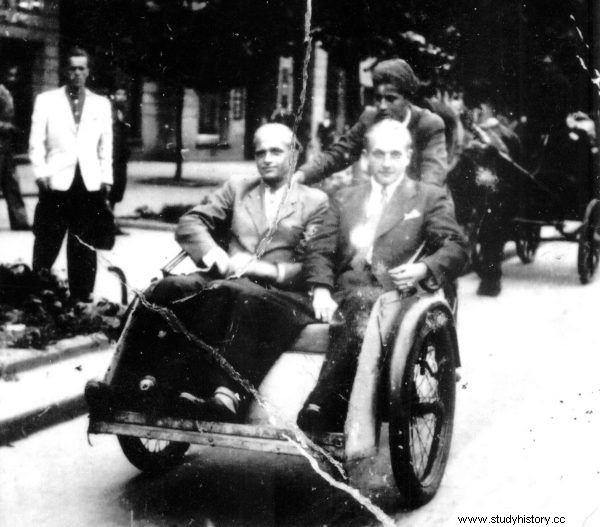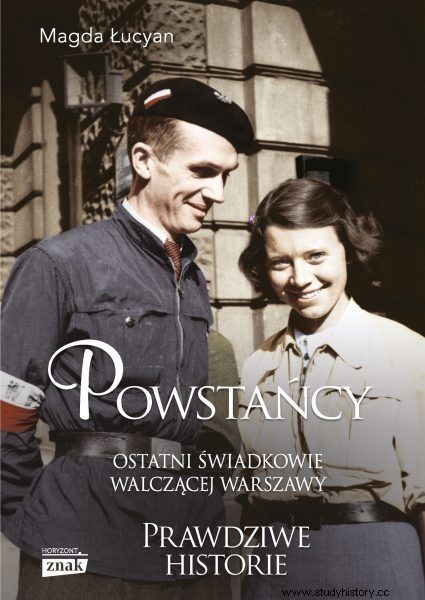"Jur" fought in Wola, the Old Town, Śródmieście and Czerniaków. He did not hesitate to risk his life again and again - he received a number of awards for his heroism in the Warsaw Uprising. Years later, however, he admits that not everything went as it should ...
[Tells Edmund Baranowski, pseudonym "Jur":]
It can be said that when the Uprising broke out, I was already an adult. I started my twentieth year, which means I was much older than most of the insurgents. The boys in my ward were mostly fifteen, sixteen and seventeen-year-olds. Did I wonder whether to participate in this riot or not? Never. It was obvious to me that I was going to fight. I had been a member of the Home Army for three years now and I was ready for any eventuality.
"There was joy in the air"
For this important day, we prepared ourselves mentally and physically for many months. We knew what we were going to attack and how to behave. Each of us realized that we could die. But let's agree, the same risk came with leaving the house throughout the occupation . You could fall into a round-up or an action you didn't know about, and shots were fired.
The first day of August was amazingly beautiful and sunny. At ten-thirty in Warsaw, the air defense sirens sounded, but as the day was cloudless, we saw that the sky was empty and there were no planes on it. We were all surprised, we didn't know what was going on. Even the commander of the German garrison, General Reiner Stahel, wrote in his memoirs that the sound of these sirens surprised him too. To this day, it is not known who launched them and why. They howled for three minutes and caused considerable anxiety. After all, we have planned the Uprising for this day.
Soon my friends came to me with the information that we were to report to the Wolski Hospital. On our way to the assembly point, we gathered the remaining platoon mates along the way. On the spot, each of us was given a white and red armband. It aroused unusual emotions. There was joy in the air, we just felt free in a way . We dreamed about it for a very long time, throughout the occupation. At the same time, machine gun salvos could be heard somewhere in the background. We have not forgotten for a moment why we are here and what is our task (…).

In 1944, the insurgents were ready for anything. Photo from the book "Insurgents" (Edmund Baranowski in the rickshaw on the left).
In the Uprising I was a soldier. It meant that I had to be always at my post and always ready for action. The tasks were different:either observing the foreground, or short trips outside to get additional weapons, which was extremely difficult, or, of course, action with weapons in hand. They were the heaviest. There was only one thought in my head then - not to get hit and survive . Choose a position where you can observe what is happening around you, but at the same time be carefully shielded.
Explosion and Wall of Fire
There were many times when we could die, especially when we were on the attack, but there were also dangerous situations in the observation positions. And here I have this memory:we fired from buildings at Książęca Street on the corner with Rozbrat Street. Several hundred meters from us there was an entrance to the tunnel of the cross-city line. There were two of us at the police station:me and Tadeusz Jędrzejewski "Wszebor".
At one point, two Germans appeared on the horizon. Tadek whispered: "I shoot the first, you take the second!" . The first one fell, the second one was injured… And literally a few seconds later all hell broke loose, a sea of fire, of course, directed towards us! The shots did not stop even for a moment, and we were sitting in a tiny building where it was hard to hide.
We had to run away. We miraculously escaped alive. The soldiers from Czerniaków, who had been stationed there for many weeks (because I ended up there from Wola and the Old Town), were completely surprised to find out where such a strong attack from the German had come from, they had never done so before. Apparently we hit someone important.

The article is an excerpt from the book by Magda Łucyan "Powstańcy. The last witnesses of fighting Warsaw ” (Horizon 2019 sign).
Another dangerous situation also took place in Czerniaków. The situation in which I was injured. The circumstances were this:I was manning the position in a bunker made of paving slabs. Everything happened at Książęca Street. It was dusk. I heard some murmurs, noises, so I unlocked my gun and gently ejected it. Then boom! Explosion and wall of fire.
I felt a strong blow to my face, there was blood ... Lots of blood, it was flowing from the neck and ear. I started calling "Sławka" Jędrzejewska, our nurse, to do something, and she with complete calmness in her voice said that I would be fine, that it was nothing dangerous . The next day, in the hospital, it turned out that my jaw and cheek were damaged. I lost a few teeth, but it wasn't really that serious (…).
"We were convinced that the Uprising was in good hands ..."
To a large extent, I am critical of the decision about the outbreak of the Uprising. Originally, the date was set for August 2 or 3. Colonel "Monter" was supposed to go to Praga to check the situation. On the way, he reportedly met two people who told him that the Russian tanks were very close and that they would definitely help us. Although he did not check it, he decided to return to Warsaw immediately and, despite the lack of all the commanders, informed that it was necessary to immediately decide on the outbreak of the Uprising. The date is August 1.
However, at the same time, in the outskirts of Warsaw, a great tank battle involving over a thousand tanks was ending, which, oddly enough, was lost by the Russians. Strange because it was the first lost battle in many, many months. So they started to withdraw from Warsaw to the east, and we were preparing for a joint insurgent action! Due to these two parallel events, the chances of success in our fighting weakened considerably. We were all convinced that the Uprising was in good hands and that we should take up a fight, but later we had many surprises .

Years later, Edmund Baranowski is critical of the decision to start the Warsaw Uprising. Photo from the book "Insurgents".
The first was that there was no gun. This is evidenced by the fact that the first telegram sent to London was "Drop our weapons and ammunition!" And these demands were repeated for four days! Another surprise was that no one is planning to help us, that we are doomed to failure .
At the same time, it is very important to me that the good memory of the soldiers of the Warsaw Uprising survives, who, in difficult conditions, made an extremely difficult decision and a difficult fight. We were defeated, but we always tried to maintain our military dignity and the memory of our homeland.
Source:
The above text was originally published as part of the book by Magda Łucyan Powstańcy. The last witnesses of fighting Warsaw , Published by the Znak Horyzont publishing house.
The title, lead, illustrations with captions, boldface text, explanations in square brackets and subheadings come from the editors. The text has undergone some basic editing to introduce more frequent breakdown of paragraphs. For the sake of integrity of the text, the footnotes in the book version have been removed.
Check where to buy "Insurgents":
